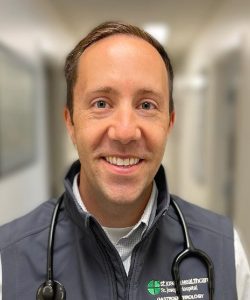While talking about the gut, or more specifically the colon, can make some people squeamish, it is perhaps one of the most important topics of conversation you can have with your doctor. Why, you ask?
Here are 10 facts you should know and normalize when it comes to your colon health:

- Colon cancer is the third most common new diagnosis among men and women.
- Colon cancer is the third leading cause of death due to cancer among men and women.
- Colon cancer is affecting more people at a younger age. While the death rate has dropped, that is not the case for people under the age of 55.
- Colon cancer is detected more often and earlier, allowing doctors to treat and cure it.
- As of 2021, the recommended age for colonoscopies dropped from age 50 to age 45, regardless of family history.
- A colonoscopy is the only diagnostic and therapeutic test available. It is the only test available that can detect polyps and remove them at the same time.
- If you are average risk and don’t have any abnormal findings during a colonoscopy, you won’t need a follow-up screening for another 10 years.
- The prep has changed in the last 15 years—making it better tolerated by most people.
- Patients have three options for sedation: monitored anesthesia care (MAC), which offers a quick way to fall asleep and wake up—with no pain during the procedure; moderate sedation—in which you may or may not feel some discomfort, or no sedation—in which you are likely to feel some mild to moderate discomfort.
- You can call and schedule your own colonoscopy.
 In a recent interview with Michael Sighinolfi, MD, Gastroenterologist at St. Joseph Healthcare, he shared that many patients say the anticipation of the prep and colonoscopy were worse than the actual experience, and they wished they would’ve done it sooner. “I am very passionate about colonoscopies. I feel it is by far the best screening modality to detect and prevent this silent killer. It will be my screening modality of choice when I am due for colon cancer screening.”
In a recent interview with Michael Sighinolfi, MD, Gastroenterologist at St. Joseph Healthcare, he shared that many patients say the anticipation of the prep and colonoscopy were worse than the actual experience, and they wished they would’ve done it sooner. “I am very passionate about colonoscopies. I feel it is by far the best screening modality to detect and prevent this silent killer. It will be my screening modality of choice when I am due for colon cancer screening.”
While the recommended screening age has dropped to 45 years old, Sighinolfi explains that a patient who has a first degree relative with colon cancer, or has experienced symptoms, should start screenings at a younger age. “The beauty of this process is that patients can be empowered to schedule their own colonoscopy. They don’t have to wait on their doctor to make the referral.”
To schedule your colonoscopy, simply call St. Joseph Digestive Health at 907-3550. The team will communicate and coordinate with your primary care provider to ensure all details are covered prior to the procedure, to help reduce stress and put patients at ease.